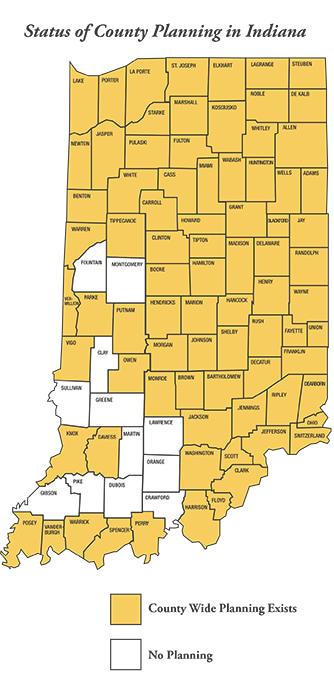Stay Informed
With or without zoning, counties need to consider ‘what’s right for them’
Counties without zoning ordinances provide an opportunity for county Farm Bureaus to be involved in the process at the outset. If your county is considering adopting zoning, the first step is deciding what the county should look like in regards to agriculture.
 “They [the counties] need to do what’s right for them. They need to think about how much regulation they want,” said Jamie Palmer, senior policy analyst at the Indiana University Public Policy Institute. “I think a few counties in southern Indiana are going with what I call ‘zoning light’ where they’re really just taking a few things they want to protect and leaving off what a lot of other communities would choose [to include].”
“They [the counties] need to do what’s right for them. They need to think about how much regulation they want,” said Jamie Palmer, senior policy analyst at the Indiana University Public Policy Institute. “I think a few counties in southern Indiana are going with what I call ‘zoning light’ where they’re really just taking a few things they want to protect and leaving off what a lot of other communities would choose [to include].”
Palmer said there is a lot of flexibility in zoning and counties should map out ways to address the areas of concern. She said zoning can be as simple as knowing that the county wants to protect industrial or residential areas. Then, the rest of the county can remain fairly permissible throughout.
Jeff Cummins, Indiana State Department of Agriculture director of policy and regulatory affairs, echoed Palmer’s thoughts on purposefully building an identity for a county. Cummins said before a county moves into zoning they need to seriously think about what they want to achieve. He added that the zoning ordinance needs to be a reflection of the county’s comprehensive plan.
“The comprehensive plan is your guidance document for the growth and development of your community,” Cummins said. “The zoning ordinance should be the mechanism you use to achieve those goals set in the comprehensive plan.”
According to the “Citizen Planner Manual” created by the Indiana Chapter of the American Planning Association, the first step for a county that wishes to move to zoning is to appoint a plan commission. Then, the plan commission prepares the comprehensive plan, which must be approved by the appropriate legislative body (usually the county commissioners). Lastly, the zoning ordinances are written and submitted for approval to the legislative body.
INFB staff is willing to meet with county Farm Bureau board members to assess comprehensive plans and potential zoning ordinances in counties making the transition.




